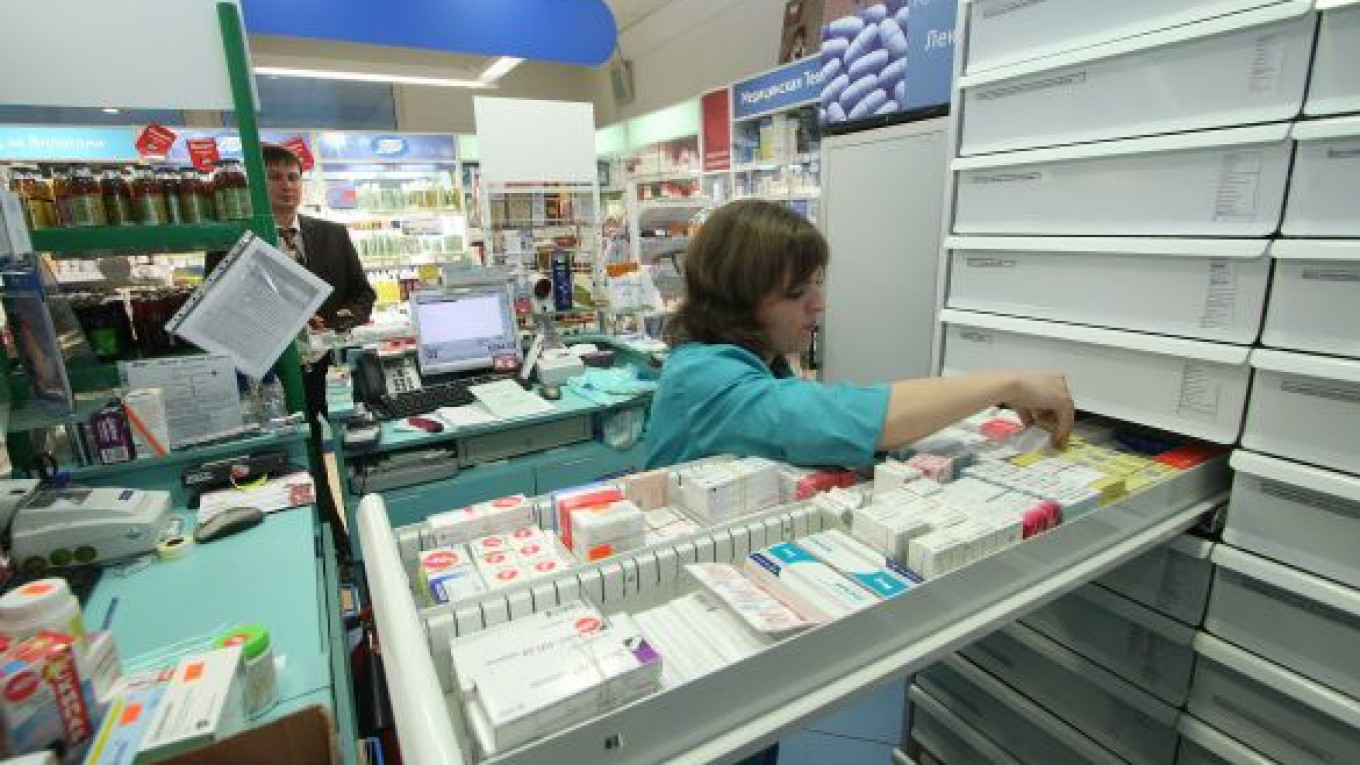Pharmsynthez said it intends by 2014 to be the first Russian pharmaceutical company to list on a U.S. stock exchange, following its Moscow initial public offering next month.
The decision to have shares listed on the Nasdaq stock exchange is largely driven by the attractiveness and value of the company's portfolio, said Pharmsynthez chief executive Dmitry Genkin.
“We have an effective portfolio of medicines, for which there is strong potential international demand. So a listing in Europe or the United States makes sense as it should enable us to increase the overall value and recognition of our medicines internationally,” he said in an interview with The Moscow Times.
The company's U.S. listing will come after completion of clinical trials of innovative drugs in Europe within the next three to four years, Genkin said.
The company plans to raise at least 450 million rubles ($15 million) through a MICEX offering scheduled for November, which will be part of its investment program of 600 million rubles for the next two years.
Pharmsynthez plans to spend about 45 percent of the funds on acquisitions of European pharmaceutical companies, Genkin said.
He said the company would acquire several biotechnological manufacturers abroad, adding that Pharmsynthez was targeting three companies — two in Europe and one in Israel.
The deals will give Pharmsynthez a foothold on Western markets and increase the company's profitability, Genkin said.
Clinical trials in Europe will cost 160 million rubles, while 40 million rubles will be spent to build representative offices in Russia's regions.
Pharmsynthez is holding European trials of its new drug Virexxa, which is aimed at treating cancer. Local sales of the medicine, which is currently in the second stage of clinical trials, will start in 2012, while European sales are scheduled to start in 2013.
The company also plans to start European clinical trials of two other innovative medicines — one for treating multiple sclerosis and another for cystic fibrosis — by the third quarter of 2011.
Genkin also said Pharmsynthez planned to list shares on the Swiss stock exchange by 2013.
He thinks there is a high likelihood of Russian pharmaceutical companies seeing demand by foreign investors, saying it makes sense for them to list shares abroad.
“Why not? … If we make a unique product, we make it not only for Russia, but Europe and the United States as well,” he said.
Maxim Rozenblit, business development director of corporate finance at Metropol, said the U.S. stock market, which offers a wider range of potential investors, was more interesting for Russian companies than the local one.
He said, however, that “a small company operating only in Russia was unlikely to attract global investors."
He also said it was too early to judge whether a listing by Pharmsynthez in the United States would be successful. “Let's first see how their Russian IPO goes,” he said.
“Listing on Nasdaq may be the next step before selling the business to a big investor or another pharmaceutical company,” said Yekaterina Andreyanova, an analyst with Rye, Man & Gor Securities.
Andreyanova said that listing in London, on the other hand, could demonstrate the company's orientation to long-term investors.
Genkin said it made sense to come to Western markets only with original drugs.
“It makes no sense to come with generic drugs. But if our companies come with innovative, medicines they'll succeed. I have no doubts,” he said.
Genkin is not worried about competition on the European market. “Pharmsynthez drugs will be sold where there are no alternatives — there's no one to compete with,” he said.
Pharmsynthez plans to participate in the government's Pharma 2020 program, aimed, among other things, at stimulating domestic production of innovative medicines.
The medicines developed by Pharmsynthez are supposed to replace those that the country is currently importing, Genkin said.
As part of its investment program, Pharmsynthez has allocated 130 million rubles to build a second plant in the Leningrad region.
The plant, whose opening is scheduled for 2012, will make medicines that the company sells now, and those still under development.
The share price range for the company's MICEX offering is 20.6 rubles to 27.7 rubles per ordinary share, Pharmsynthez said last month. A total of 22 million shares, or one-third of the company's equity capital, will be floated.
Genkin owns a 25 percent stake in Pharmsynthez, while the remaining 75 percent of the company belongs to an international private equity fund, Amber Trust, set up for investment in Russia and the Baltic countries.
Another key player on the Russian pharmaceutical market, Pharmstandard, raised a total of $880 million from initial public offerings on MICEX and the London Stock Exchange in 2007.
A spokesman for Pharmstandard said the company had no plans to list on other stock markets.
A Message from The Moscow Times:
Dear readers,
We are facing unprecedented challenges. Russia's Prosecutor General's Office has designated The Moscow Times as an "undesirable" organization, criminalizing our work and putting our staff at risk of prosecution. This follows our earlier unjust labeling as a "foreign agent."
These actions are direct attempts to silence independent journalism in Russia. The authorities claim our work "discredits the decisions of the Russian leadership." We see things differently: we strive to provide accurate, unbiased reporting on Russia.
We, the journalists of The Moscow Times, refuse to be silenced. But to continue our work, we need your help.
Your support, no matter how small, makes a world of difference. If you can, please support us monthly starting from just $2. It's quick to set up, and every contribution makes a significant impact.
By supporting The Moscow Times, you're defending open, independent journalism in the face of repression. Thank you for standing with us.
Remind me later.






